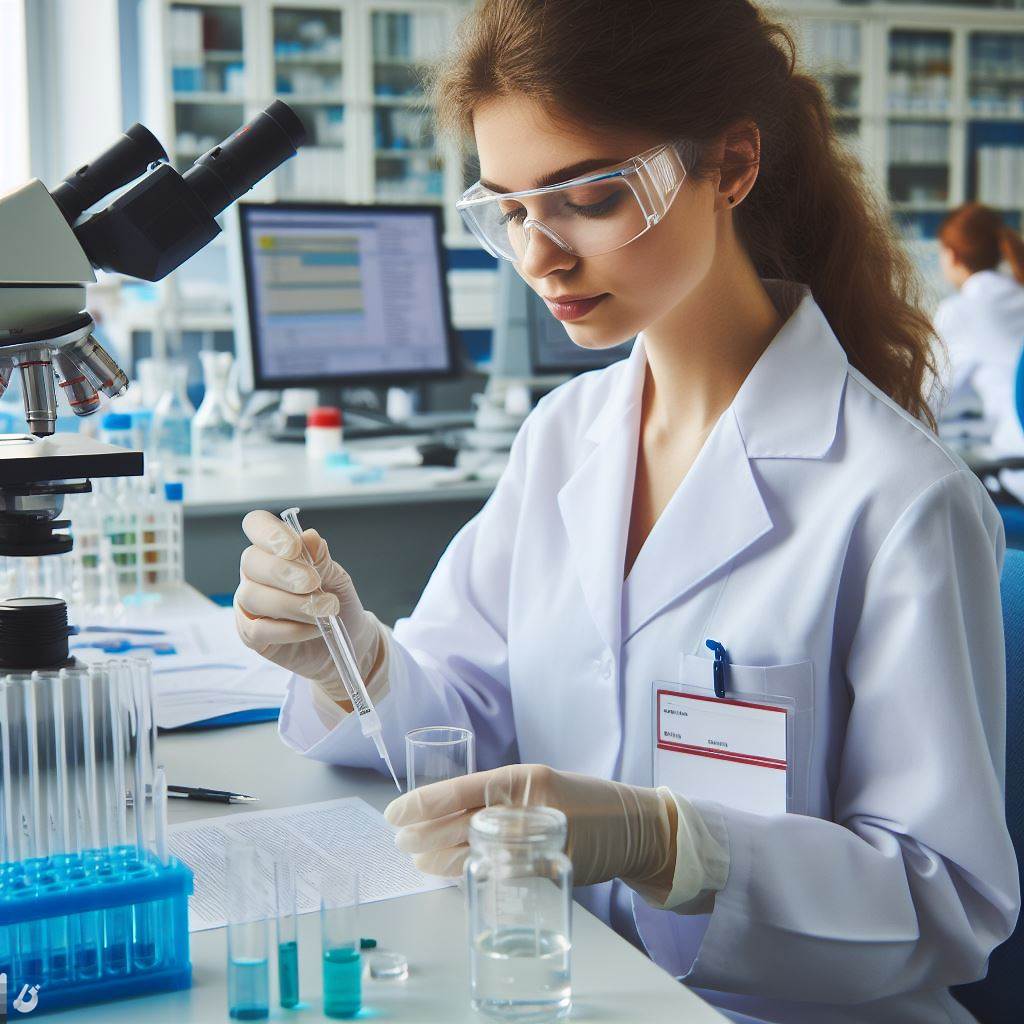Introduction
Lab Techs in the UK market play a crucial role in various industries. Their importance and relevance cannot be undermined. From healthcare to research, Lab Techs contribute significantly to advancements and innovation.
Lab Techs are responsible for conducting experiments, analyzing data, and ensuring the smooth functioning of laboratories. They provide essential support to scientists, researchers, and healthcare professionals.
In the healthcare sector, Lab Techs perform diagnostic tests, analyze samples, and interpret results. They play a vital role in disease detection and monitoring, enabling timely treatment and better patient outcomes.
Lab Techs also contribute to the pharmaceutical industry by assisting in drug development and testing.
Their expertise in conducting experiments and analyzing results helps in ensuring the safety and efficacy of medications.
In addition to healthcare, Lab Techs are essential in environmental science, forensics, and food safety industries.
They help in monitoring pollution levels, analyzing crime scene evidence, and ensuring the quality and safety of food products.
The future of Lab Techs in the UK market appears promising.
Advancements in technology, such as automation and artificial intelligence, are revolutionizing the field.
Lab Techs will need to adapt to these changes by gaining the necessary skills and knowledge.
Furthermore, the ongoing COVID-19 pandemic has highlighted the critical role of Lab Techs in managing outbreaks and testing for the virus.
Their contribution in developing diagnostic tests and analyzing samples has been paramount in controlling the spread of the disease.
Basically, Lab Techs in the UK market are crucial for various industries. Their expertise and support are invaluable in advancing scientific research, improving healthcare, and ensuring the safety of the community.
As technology continues to evolve, Lab Techs should embrace new developments to stay relevant and contribute effectively.
Current state of Lab Techs in the UK
The current demand for Lab Techs in the UK market
- The demand for Lab Techs in the UK market is constantly increasing due to various factors.
- According to recent statistics, there has been a significant rise in the employment of Lab Techs in the UK.
- The healthcare industry is one of the key sectors heavily relying on the skills and expertise of Lab Techs.
- Pharmaceutical companies also heavily depend on Lab Techs for research, development, and quality control processes.
- Another industry that heavily relies on Lab Techs is the food and beverage industry, especially in quality assurance and control departments.
- The demand for Lab Techs in the biotechnology sector is also expected to grow significantly in the coming years.
- The rise in clinical research and genetic testing has contributed to the increased need for Lab Techs.
- The government and public sector organizations also employ Lab Techs for various scientific research projects.
- The employment of Lab Techs is not limited to large organizations, as small and medium-sized companies also require their services.
- The advancements in technology and automation have also impacted the role of Lab Techs, with a shift towards more specialized tasks.
Statistics or trends regarding the employment of Lab Techs
- The future for Lab Techs in the UK market looks promising, with an expected growth in demand.
- The continuous advancements in medical and scientific research will lead to an increased need for Lab Techs.
- With the aging population and the rise in chronic diseases, the healthcare sector will require more Lab Techs for diagnostic purposes.
- The development of new drugs and therapies will create additional opportunities for Lab Techs in the pharmaceutical industry.
- The food and beverage industry will continue to rely on Lab Techs for ensuring product safety and quality.
- The increasing focus on personalized medicine and genetic testing will require Lab Techs with specialized skills.
- The role of Lab Techs is expected to evolve with the integration of artificial intelligence and automation in laboratory processes.
- Lab Techs will need to adapt to new technologies and acquire additional skills to stay relevant in the changing market.
- The demand for Lab Techs in the biotechnology sector is expected to surge with the emergence of new biotech startups.
- The government’s initiatives to promote research and development will create more job opportunities for Lab Techs.
In general, the demand for Lab Techs in the UK market is on the rise, with various industries heavily relying on their expertise.
The future prospects for Lab Techs look promising, with advancements in technology and a growing emphasis on research and development.
Lab Techs will play a vital role in driving innovation and ensuring quality in various sectors, making them a valuable asset in the UK job market.
Read: Famous UK Research Scientists and Their Work
Technological advancements shaping the future of Lab Techs
As technology continues to advance at an exponential rate, it is no surprise that the field of laboratory technology is also experiencing significant changes.
Emerging technologies are revolutionizing the role of Lab Techs in the UK market, bringing about both opportunities and challenges. Let’s delve into the impact of these advancements:
1. Emerging technologies and their impact
- Improved data analysis tools enable Lab Techs to handle vast amounts of complex data more efficiently.
- Artificial intelligence and machine learning algorithms empower Lab Techs to make more accurate diagnoses and predictions.
- Virtual reality and augmented reality technologies provide immersive training experiences for Lab Techs, enhancing their skills.
- IoT devices and wearables enable Lab Techs to collect real-time data, improving patient monitoring and diagnostics.
- 3D printing technology allows Lab Techs to create customized medical models and prototypes rapidly.
2. Automation and artificial intelligence in lab processes
- Automated lab equipment, such as robotic arms and high-throughput analyzers, streamline repetitive tasks and improve efficiency.
- Intelligent algorithms can analyze laboratory samples and provide instant results, reducing turnaround time.
- AI-powered image recognition software assists in identifying microscopic abnormalities in samples, aiding in disease detection.
- Automation and AI decrease the risk of human error, ensuring higher accuracy in lab procedures.
- Lab Techs can focus on more complex tasks that require critical thinking and problem-solving skills.
3. Potential benefits and challenges
While technological advancements bring numerous benefits, they also present challenges that Lab Techs need to navigate:
Benefits:
- Increased efficiency and productivity due to automation, allowing Lab Techs to handle higher workloads.
- Better patient outcomes with the help of AI-driven diagnostics, leading to more precise and timely treatment.
- Enhanced accuracy in lab tests, reducing the chances of misdiagnosis or inaccurate results.
- Improved job satisfaction as Lab Techs can focus on intellectually challenging and innovative tasks.
- Opportunities for professional growth in emerging technology-related fields within healthcare and research.
Challenges:
- The need for continuous upskilling and training to adapt to evolving technologies.
- Potential job displacement as automation and AI take over routine lab tasks.
- Data security and privacy concerns, especially with the increasing use of IoT devices and cloud-based platforms.
- Implementation and maintenance costs of new technologies might be a barrier for some organizations.
- Ethical considerations regarding the use of AI in decision-making processes and patient privacy.
In short, technological advancements are profoundly shaping the future of Lab Techs in the UK market.
As emerging technologies like automation and artificial intelligence become more prevalent, Lab Techs must embrace these changes and acquire the necessary skills to thrive in this digital era.
While there are potential challenges, the benefits of technology in improving efficiency, accuracy, and patient outcomes cannot be ignored.
Lab Techs who can adapt and leverage these advancements will undoubtedly play a crucial role in the healthcare industry’s ongoing progress.
Read: Balancing Life and Work as a UK Scientist

Changing skillset and qualifications
1. Evolving skillset for Lab Techs
Lab technicians are experiencing a shift in the skillset required to meet the demands of the evolving industry.
- Technological proficiency: Lab techs need to possess advanced technological skills to effectively operate the modern equipment and machinery.
- Data analysis and interpretation: With the advent of automated lab processes, lab techs must excel in data analysis and interpretation to derive meaningful insights from experiments.
- Collaboration and communication: Lab techs now require excellent collaboration and communication abilities to work effectively in multidisciplinary teams.
2. Impact of technology on necessary qualifications
The advancements in technology have significantly influenced the qualifications required for lab technicians.
Personalized UK Career Consulting
Receive tailored career guidance designed just for you. Get actionable steps and expert support to boost your career in 1-3 days. Take control of your career now.
Get Started- Knowledge of automation: Understanding and operating automated machines and robots has become a fundamental qualification for Lab Techs in the UK market.
- Proficiency in data management: Handling large datasets, utilizing data management software, and statistical analysis tools are essential skills.
- Familiarity with specialized software: Lab techs should be proficient in using software specific to their field, such as molecular modeling or laboratory information management systems (LIMS).
3. Importance of continuous professional development and upskilling
Continuous professional development is crucial for lab techs to remain competent and stay relevant in the UK job market.
- Keeping pace with technology: Regularly updating skills and knowledge is essential to adapt to advancements and maintain proficiency in using new lab technologies.
- Pursuing additional certifications: Lab techs should consider obtaining additional certifications to enhance their qualifications and demonstrate their commitment to their profession.
- Attending workshops and conferences: Participating in workshops and conferences allows lab techs to learn about the latest advancements and exchange knowledge with industry experts.
- Mentoring and mentoring programs: Engaging in mentoring programs can be beneficial for lab techs to gain new insights and guidance from experienced professionals in their field.
- Emphasizing soft skills development: Lab techs should focus on enhancing their soft skills, such as problem-solving, critical thinking, and adaptability, to thrive in a changing work environment.
Ultimately, the skillset required for lab techs is evolving, with a greater emphasis on technological proficiency, data analysis, and collaboration abilities.
The impact of technology has influenced the necessary qualifications, making knowledge of automation, data management, and specialized software vital.
Continuous professional development and upskilling remain essential for lab techs to keep pace with advancements and succeed in the UK job market.
Read: Climate Change Research in the UK Explained
Growth opportunities for Lab Techs
In today’s rapidly evolving scientific landscape, Lab Techs play a crucial role in various industries.
With advancements in technology and emerging fields, the demand for specialized Lab Techs has increased significantly.
Identifying industries with potential growth opportunities, understanding the demand for specialized Lab Techs, and staying updated with industry trends are essential for career advancement.
Identifying industries with potential growth opportunities for Lab Techs
- Biotechnology: The biotech industry is experiencing exponential growth, creating ample opportunities for Lab Techs. Their expertise is invaluable in conducting experiments, analyzing data, and developing new drugs.
- Genetics and Genomics: With the rise of genetic testing, Lab Techs specializing in genetics and genomics are in high demand. They play a vital role in decoding DNA and identifying genetic disorders.
- Pharmaceuticals: The pharmaceutical industry relies heavily on Lab Techs to ensure the quality and safety of drugs. They perform various tests, including drug potency, purity, and efficacy.
- Environmental Science: Lab Techs focusing on environmental science are crucial in monitoring pollution levels, analyzing air and water quality, and developing sustainable solutions.
- Forensic Science: The field of forensic science heavily relies on Lab Techs for analyzing crime scene evidence, DNA testing, and performing chemical analyses to assist in solving crimes.
The demand for specialized Lab Techs in emerging fields
As technology continues to advance, Lab Techs specializing in emerging fields are in high demand:
- Genetic Counseling: With advancements in genetic testing, Lab Techs with expertise in genetic counseling are needed to help individuals understand and make informed decisions based on their genetic information.
- Biomedical Engineering: Lab Techs with knowledge in biomedical engineering are crucial in developing and testing medical devices, prosthetics, and artificial organs.
- Nanotechnology: Lab Techs specialized in nanotechnology are instrumental in researching and manipulating materials at the atomic and molecular level, leading to breakthroughs in medicine, electronics, and materials science.
- Artificial Intelligence (AI): As AI becomes more prevalent, Lab Techs skilled in working with AI algorithms and data analysis are essential for developing and optimizing AI-driven technology in various industries.
The importance of staying updated with industry trends for career advancement
Staying updated with industry trends is crucial for Lab Techs to remain competitive and take advantage of growth opportunities:
- Technological advancements: Lab Techs need to stay updated with the latest laboratory equipment, software, and analytical techniques to enhance efficiency and accuracy.
- Quality standards and regulations: With frequent updates in quality standards and regulations, Lab Techs must stay informed to ensure compliance and maintain high-quality work.
- New research and discoveries: Keeping up with new research and breakthroughs in their field enables Lab Techs to apply innovative techniques and contribute to scientific advancements.
- Networking and professional development: Attending conferences, workshops, and networking events allows Lab Techs to build connections, learn from experts, and stay informed about job opportunities.
- Career growth: By staying updated with industry trends, Lab Techs can identify emerging fields and acquire the necessary skills and knowledge for career advancement.
Lab Techs who actively seek growth opportunities, specialize in emerging fields, and stay updated with industry trends will be well-positioned for a successful and fulfilling career in the UK market’s future.
Read: Networking Tips for UK Research Scientists
Find Out More: Overcoming Challenges in UK Scientific Research
Job market outlook and salary prospects
Examining the future job prospects for Lab Techs in the UK
Lab technicians play a crucial role in the healthcare and scientific industries, and the future job prospects for this field in the UK are quite promising.
Advancements in medical research and technology have increased the demand for skilled lab techs, and this trend is expected to continue in the coming years.
The UK government’s focus on healthcare and research funding further supports the growth of lab tech positions.
The National Health Service (NHS) and private research institutions provide numerous job opportunities.
Additionally, the aging population and advancements in personalized medicine create a need for more laboratory testing, which directly contributes to the demand for lab techs.
Factors influencing salary levels for Lab Techs
Several factors have an impact on the salary levels for lab techs in the UK:
Your Dream Job Starts with a Perfect CV
Get a tailored CV and cover letter that captures your unique strengths and stands out in your industry. Let us help you make an unforgettable first impression.
Get Started- Experience: More experience often leads to higher salaries as it demonstrates proficiency and mastery in the field.
- Education and certifications: Lab techs with advanced degrees or specialized certifications tend to earn higher salaries.
- Industry and sector: Different sectors, such as pharmaceuticals, academic research, or diagnostic laboratories, offer varying salary levels.
- Geographic location: Salaries can differ depending on the cost of living and demand for lab techs in specific regions.
- Job responsibilities: Lab techs with additional responsibilities, such as supervisory or managerial roles, may receive higher compensation.
Present salary ranges and growth potential in the field
Salaries for lab techs in the UK vary based on the factors mentioned above. On average, entry-level lab techs can expect a salary range between £18,000 and £25,000 per year.
With experience and specialized skills, lab techs can progress to more senior roles, such as senior laboratory technician or laboratory manager, earning salaries ranging from £25,000 to £45,000 per year.
Lab techs who pursue additional education, such as a master’s degree or a Ph.D., may have access to even higher salary ranges.
Moreover, the growth potential in the field is significant. As technology advances and the demand for laboratory testing increases, opportunities for career advancement and salary growth are expected to expand.
Lab techs can specialize in various areas, such as genetics, microbiology, or forensic science, which opens up career paths in specific industries.
Additionally, lab techs can pursue further education and move into research or teaching positions, leading to higher salaries and increased job satisfaction.
Most importantly, the job market outlook for lab techs in the UK is promising, with a growing demand for skilled professionals in various sectors.
Factors such as experience, education, industry, location, and job responsibilities influence salary levels.
The field offers a wide salary range, and with career progression and specialization, lab techs can enjoy significant growth potential.
Conclusion
In closing, the future of Lab Techs in the UK market is promising.
The key points discussed in this blog post highlighted the increasing demand for Lab Techs due to advancements in technology and healthcare.
It is crucial for Lab Techs to adapt and continuously learn new skills to stay relevant in the industry.
Adaptability and continuous learning are of utmost importance for Lab Techs to thrive in the rapidly evolving field.
With the introduction of new technologies, Lab Techs must stay updated and acquire the necessary expertise to handle complex tasks.
Despite challenges, the future looks bright for Lab Techs in the UK market.
The demand for skilled professionals in laboratories and healthcare settings is expected to increase, offering numerous job opportunities.
Lab Techs can also explore diverse specializations and career paths, making their job prospects even more promising.
It is important for Lab Techs to embrace change and seek professional development opportunities to enhance their skills.
By doing so, they can adapt to the evolving industry and confidently contribute to advancements in healthcare.
In the end, while the future of Lab Techs may present challenges, their adaptability and commitment to continuous learning will enable them to excel in the UK market.
With a positive outlook and dedication to professional growth, Lab Techs can secure a successful and fulfilling career in the evolving field of laboratory technology.
[E-Book for Sale]
500 Cutting-Edge Tech Startup Ideas for 2024 & 2025: Innovate, Create, Dominate
$19.99 • 500 Tech Startup Ideas • 62 pages
You will get inspired with 500 innovative tech startup ideas for 2024 and 2025, complete with concise descriptions to help you kickstart your entrepreneurial journey in AI, Blockchain, IoT, Fintech, and AR/VR.




